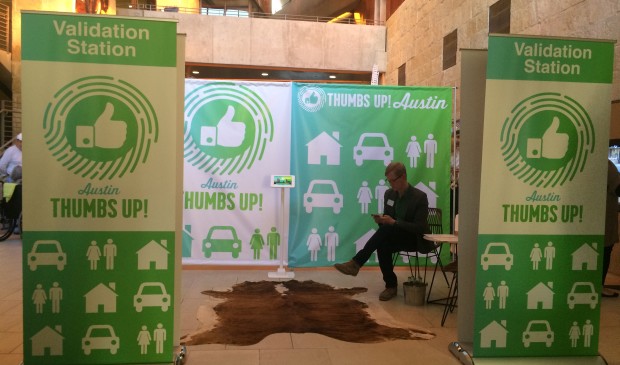Council stalls mandatory fingerprinting for TNCs, adopts voluntary program instead
Friday, January 29, 2016 by
Eva Ruth Moravec City Council on Thursday stalled an ordinance requiring drivers for transportation network companies to pass a fingerprint-based background check and adopted incentives to motivate drivers to voluntarily submit fingerprints.
“We’re only deciding whether or not we want to encourage volunteers to get fingerprinted, and if they’re willing to do so, if it’s something the community would want to reward and encourage,” said Mayor Steve Adler, who authored the proposals.
The two items – one postponing the effective date of the TNC ordinance passed in December, and the other adopting incentives for drivers – both passed without the support of Council Member Delia Garza, who said that the December ordinance, which required fingerprinting, should remain as-is until Council is legally mandated to act on a petition to repeal the ordinance.
Meanwhile, the city clerk is nearly done validating the signatures for that petition. If the office can validate at least 20,000, Council must either adopt the petition’s proposed language or call for a May 7 election. Council is expected to make that decision next week.
Austinites “sent us a really strong message – the strongest message in the form of a citizens’ petition that City Council has ever received – and we’re ignoring it,” said Council Member Ellen Troxclair. “I signed it, and I knew exactly what I was signing. It’s time we respect our own city charter.”
Troxclair joined Garza and Council members Ora Houston and Don Zimmerman in voting “no” on the incentive ordinance, which addresses peer-to-peer enterprises in which customers connect to services through software platforms.
The new ordinance establishes rewards for drivers of all ground transportation if they submit their fingerprints and obtain a special badge. Adler has said he’d like the rules eventually to apply to other transactions in which the buyer and seller don’t know each other.
The perks include special access to large events and to-be-determined entertainment districts, plus permission to operate during to-be-determined hours, “including evening hours,” the ordinance states. Only badge-holders may load and unload in “safe loading zones,” the rules state, and they and their companies will pay discounted fees for safety programs. Passengers will be rewarded for choosing drivers with badges, as will companies that incorporate the badge in their own systems.
Known as “Thumbs Up,” the badge – actually, an iPad app – was on display outside of Council chambers Thursday. Five volunteers created the app, but another 20 contributed research to the effort, said Josh Jones-Dilworth, of JDI, who moved a rug, a table, two chairs and an orchid from his office to spruce up the display.
“For the past three weeks, we’ve been coding and designing through the night,” he said, adding that the iPads and stands were from his office, too. The signs, in neon green, were donated. “None of us are trying to make any money off of this,” he said.
Back inside chambers, Garza complimented Adler’s foresight and creativity in allowing new business models to operate in Austin but expressed concerns prompted by an Austin Chronicle headline that said, “Uber Says ‘Thumbs Down.'”
“The success of this solution depends on one really important factor, and that’s the cooperation of the TNCs,” Garza said, adding that it is clear that Uber and Lyft aren’t interested in fingerprinting.
Both companies said Thursday that they oppose Thumbs Up, and Lyft spokeswoman Chelsea Wilson disputed Adler’s previous statement that the companies worked with him on the concept.
“Segregating rideshare drivers into different groups, with different economic opportunities – all without any benefit to public safety – hurts drivers, consumers and the city of Austin,” Wilson said in a statement.
Via an emailed statement, Uber Technologies spokeswoman Debbee Hancock called Thumbs Up “a solution without a problem.” The perks for badge-holders “would cause increased congestion and limit transportation options where they are needed most,” she said.
About 15 people spoke on the ordinances at Thursday’s meeting, including David King, vice president of the Austin Neighborhoods Council, who urged members to “not be bullied by a corporation.” Both Uber and Lyft have financially and logistically supported the Ridesharing Works for Austin political action committee, which created the petition.
Suzette Christensen, the owner of the bar Karma Lounge, said Uber and Lyft have “made it a cool thing not to drink and drive.”
Pedicab driver Joseph Iley, 47, said he’s been fingerprinted since 1987 and doesn’t see why TNC drivers shouldn’t be, too.
Council voted 8-1 to postpone the December ordinance’s effective date, with Garza voting no and Zimmerman and Troxclair abstaining. The Thumbs Up proposal passed 7-4, with Garza, Houston, Zimmerman and Troxclair voting no.
After Council’s vote, many people headed out to the hall, and some walked past Jones-Dilworth’s display to a station where the Texas Department of Public Safety was taking people’s fingerprints free of charge.
A city employee who works for Uber and Lyft part-time was among those bound for the kiosk. “I only drive, at most, six hours a week,” said the woman, who declined to be named. “I just want to get ahead of the game in case fingerprinting becomes mandatory.”
Photo: Josh Jones-Dilworth was one of several volunteers who helped create an app that collects fingerprints and other identifying information for Mayor Steve Adler’s Thumbs Up plan. Jones-Dilworth brought iPads, stands, furniture and a rug to display the app outside of City Council chambers Thursday. Photo by Eva Ruth Moravec.
You're a community leader
And we’re honored you look to us for serious, in-depth news. You know a strong community needs local and dedicated watchdog reporting. We’re here for you and that won’t change. Now will you take the powerful next step and support our nonprofit news organization?






